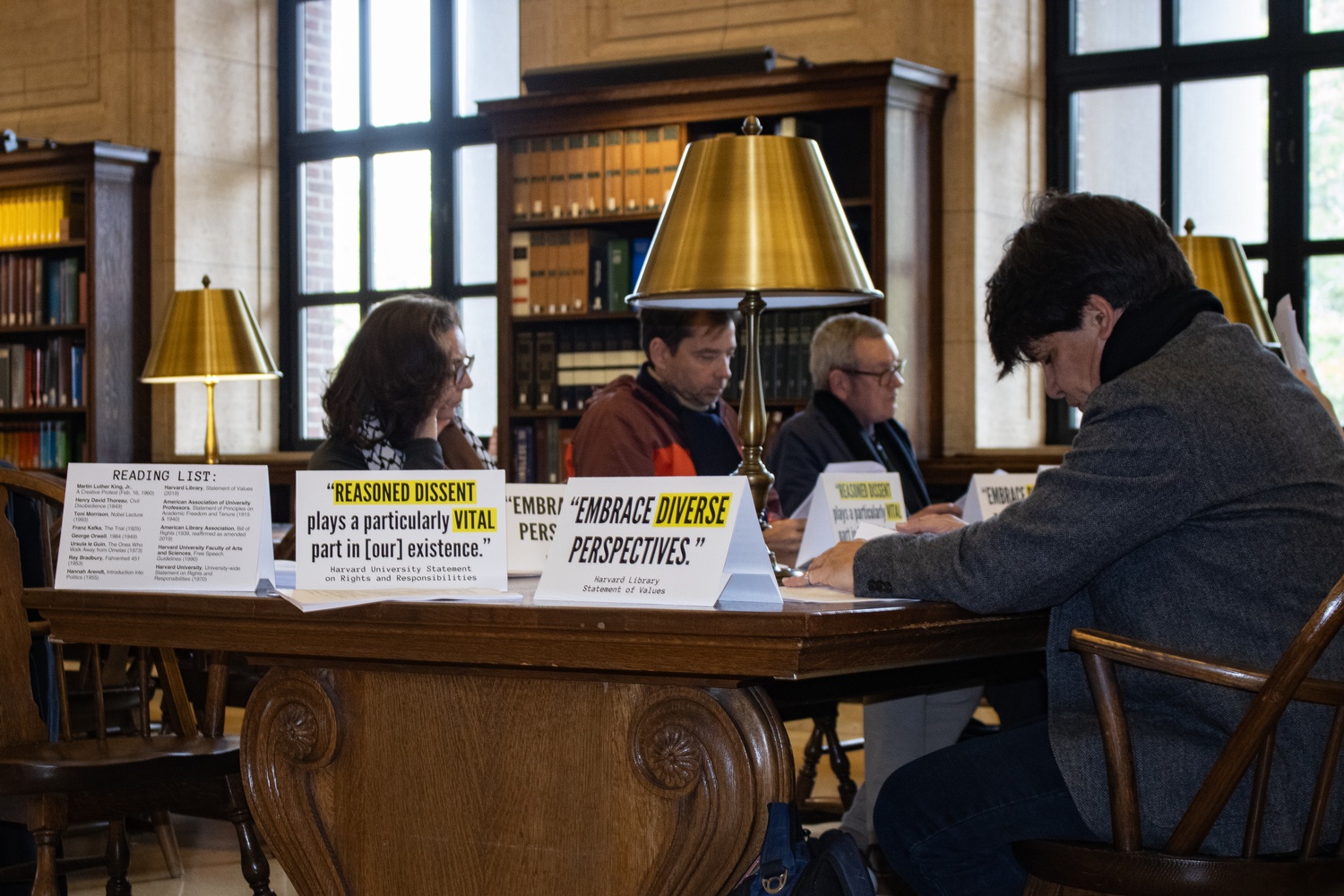
News
Summers Will Not Finish Semester of Teaching as Harvard Investigates Epstein Ties

News
Harvard College Students Report Favoring Divestment from Israel in HUA Survey

News
‘He Should Resign’: Harvard Undergrads Take Hard Line Against Summers Over Epstein Scandal

News
Harvard To Launch New Investigation Into Epstein’s Ties to Summers, Other University Affiliates

News
Harvard Students To Vote on Divestment From Israel in Inaugural HUA Election Survey
Harvard Must Reconsider Its Preposterous Library Protest Policy
When Harvard prohibited chalking on sidewalks, I couldn’t imagine a speech policy more absurd. Last week, the University managed to surprise me.
Earlier this month, a group of Harvard faculty conducted a “study-in” in Widener Library. They silently read the University-Wide Statement on Rights and Responsibilities, the Harvard Library statement of values, and other speech-related material.
Harvard’s response? To ban them from Widener.
Yes, you heard that right: Members of Harvard’s own faculty cannot access its flagship library.
Clearly something has gone very wrong. Suspending faculty members from libraries appears unprecedented — and for good reason. Universities should not be in the business of making the lives of their professors harder, certainly not when the offense in question — sitting quietly with a book in hand — is perhaps the least disruptive form of protest imaginable. These faculty members didn’t chant, hold banners, or even speak; they silently read, propping up small tent-card signs on the tables in front of them.
Furthermore, the sanctions are completely antithetical to the College’s recent efforts to expand civil discourse on campus. What is polite, quiet protest if not civil discourse?
Martha J. Whitehead, the head of the library system, claimed that the protests constituted a disturbance because “seeking attention is in itself disruptive.” With all due respect, that standard is ridiculous. I am willing to bet that the only disruption — if it could even be considered one — came from the Securitas guards rustling around the reading room taking down ID numbers.
I understand the impetus behind these new restrictive speech policies. After a tumultuous year, Harvard has an interest in maintaining order and ensuring that academic spaces, particularly libraries, remain free from disruption.
But suspending faculty members from Widener goes much too far and reveals just how out-of-touch administrators are with campus climate. The decision makes little sense if one considers Harvard’s mission to support open dialogue and intellectual exchange. Instead, it seems designed to appease outside critics who view all campus protests as disruptive or misguided. This punitive action does nothing to benefit the Harvard community; it provides no material improvement to students or faculty and certainly doesn’t protect the University’s academic spaces from genuine disturbances.
Given that the University had previously suspended students from Widener for a nearly identical offense, I can see why administrators might feel compelled to enforce the same punishment for faculty in order to set a consistent standard. But when that precedent requires sanctioning faculty for relatively minor infractions, it suggests that perhaps the standard shouldn’t have been set in the first place. Rather than doubling down on punitive measures, Harvard should be rethinking its approach, affirming its commitment to open discourse over rigid enforcement.
Harvard has an opportunity here to reassess its priorities and correct course. Rather than clinging to bureaucratic rules that stifle expression, the University could choose to embrace its mission of fostering a diverse and open intellectual environment. In this case, a reconsideration would not only benefit the faculty and students involved but would serve as a reminder of what makes Harvard — and any great university — truly resilient: its willingness to engage in self-reflection and growth.
We know that reconsideration is possible. Last week, Faculty of Arts and Sciences Dean Hopi E. Hoekstra issued new guidance permitting chalking in campus spaces, despite the University’s new campus use rules. Hoekstra and other administrators should similarly reconsider the policy regarding protests in libraries.
Institutions that genuinely value free expression should be flexible enough to make room for peaceful, non-disruptive protests, especially when they involve esteemed faculty advocating for values the University itself claims to uphold. By lifting the sanctions on these professors and reevaluating its protest policies, Harvard would be taking a necessary step toward protecting academic freedom and intellectual integrity on its campus.
Calvin D. Alexander, Jr. ’27, a Crimson Editorial editor, is a joint Comparative Literature and Music concentrator in Adams House.
Want to keep up with breaking news? Subscribe to our email newsletter.

